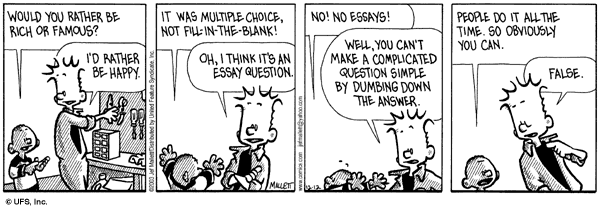“Like Mark, John begins his biographical narrative with the coming of the Baptist, but precedes his chronology with the eighteen most cryptic and provocative verses in the Bible. God, says John, is the Word, and the word is the force of creation. Most people’s first reaction to this is bemusement, or displacement, or outright denial: well, he must mean that God uses the Word as his instrument, right? Nope, not according to John — The Word is God, invisible and incorporeal, and Jesus is the Word made flesh. My Bible is the Oxford edition, it runs something like fifteen hundred pages; in the whole shebang, this is the concept I find easiest to swallow. If there’s ever going to be rapprochement between me and Christianity, it’s going to come around these eighteen verses at the beginning of John’s Gospel. Why? Because it dovetails with my own empirical experience: everything in the earth and heavens is discursively manufactured. That doesn’t mean that I don’t believe the natural world exists; I do think it’s out there, sort of. But until we’ve organized it through a collectively-held system of signs and assumptions, it may as well be nothing at all. I feel you rolling your eyes now, so I’m going to break it down slow. Look out your window, what do you see? Me, I see a tree. How do I know it’s a tree? Well, I know it’s a tree because you and me and Al from Tennessee agree that it is. If the neutron bomb dropped and we were wiped off the planet today, that tree would still be there; but with no human agent to ratify or classify it, on an important level it would cease to carry any meaning. Through language, naming, and interpersonal communication, we call that tree into existence. Turn (since you’re following at home) twelve hundred pages back to the Genesis parables. What’s the first act Adam performs? He names every beast of the field. Go back further to Chapter One; here we have the big guy summoning the universe into creation through discursive act after discursive act. God speaks the breath of life into the world; “let there be x,” he says, and x exists. This text is the ultimate illustration of speech-act theory — utterances bringing forth a cosmos. If it isn’t the most vivid passage in the Bible, it’s certainly the most consequential. The natural world rises and falls like scenery. Only the Word creates.”
–Tris McCall
Tag: wisdom
“I remember the first time I read The Lord of the Rings, in high school sometime. I read the last few pages, in which the hobbit Frodo sails in his old age for the lands of the West, where heroes go, the awful price of carrying the ring and breaking the back of darkness paid at last. I went out onto the patio of my parent’s house, and I stood for a long time, looking at the sunset. No story, no history, no instructive biography or sermon had ever made me feel the way I felt then: that humanity had an infinite capacity for nobility, for goodness, for strength used with wisdom and informed by mercy, and that I was part of that.”
–Emma Bull, “Why I Write Fantasy” (1990)
Music is a constant in my life. It’s a rare day that I go through without listening to or making music in one form or another.
And it occured to me on the way back from lunch with kitanzi this afternoon, as I cranked up a particular song, that there are some tunes that just never fail to make me happy.
Here are five of those songs, in no particular order:
Love Shack, B-52s
Sledgehammer, Peter Gabriel
Every Day I Write The Book, Elvis Costello
Got To Get You Into My Life, The Beatles
Linus and Lucy, Vince Guaraldi Trio
What are some songs that always leave you more cheerful than before? That make you dance in your seat? When you’re down, what music do you turn to to pick yourself up? What songs make you instinctively reach for the volume control to crank it up?
Share in comments. 🙂
First of all, this meme has been amusing me, but for somewhat personal reasons. Long long ago, we had officially sanctioned clans on JediMUD. At the time they were implemented, I was still a low-ranking member of the administration, and i warned them all it would end in tears. I was sadly proven correct, and one of the first acts I undertook when I became a member of the administration team a few months later was to have them all desanctioned. Jedi’s official position became “You can create whatever affiliates you want between yourself and other players, but the administration will not recognize any of those affiliates as official nor extend any special treatment towards them.” I still think this is a reasonable policy.
Anyway, flash-forward a few years, when Dina and I were hanging out mortside and complaining that no one ever did anything for the sheer fun of it. So we founded Clan Quixotic. The only requirement to join was the willingness to, at the drop of a hat, band together to, say, go kill every dragon in the game, just for the heck of it. After Dina finished the papers she had to write for her Masters degree, we celebrated by making a list of the ten hardest mobs to kill in the game at that time, and setting out to kill them all in ascending order of difficulty. We were that kind of group.
Ah the good old days. I think it’s about time to wipe the dust of my mort’s armor and clock back to Minus Time for some hack and slash.
A lot of people have been writing a lot of good stuff about electronic voting machines and their disturbing lack of audit trails. This week, PBS’s Robert Cringley weighs in with a thoughtful analysis. Go read it, it’s good stuff.
One of my favourite comic strips right now is Jef Mallett’s Frazz. Today’s strip is a good example why:

And when we come to think of it, goodness is uneventful. It does not flash, it grows. It is deep, quiet, and very simple. It passes not with oratory, it is commonly foreign to riches, nor does it often sit in the places of the mighty; but may be felt in the touch of a friendly hand or the look of a kindly eye.
–David Grayson
You can live three days without bread–without poetry, never…you need
art.
Art is an infinitely precious good, a draught both refreshing and
cheering which restores the stomach and the mind to the natural
equilibrium of the ideal. You understand its function , you gentlemen of
the bourgeoisie–whether lawgivers or businessmen–when the seventh or
eighth hour strikes and you bend your tired head towards the embers of
your hearth or the cushions of your armchair. That is the time when a
keener desire and a more active reverie would refresh you after your
daily labors.
–Charles Baudelaire “To the Bourgeois” – The Salon of 1846 (1846)
Just some musing after a conversation I had with a friend.
Several years ago, at one of the last Magic Carpet Cons in Chatanooga, I was having a conversation with Dr. Jane Robinson. It was Sunday morning, and I had already checked out of my hotel room and packed everything into the car with the exception of my laptop computer, which I didn’t trust to leave unattended for several hours, so I had it in a carry case slung over my shoulder.
As is usual on a Sunday at a con, I was slightly sleep deprived and a little stiff. At one point, I flexed my back to try and work out a particular knot of soreness between my shoulders.
“What’s wrong?” Dr. Jane asked. “Oh, just a little stiff. And this thing is heavy,” I replied, nodding toward the laptop case.
She nodded sensibly. “Then put it down.”
This had not actually occured to me. I set the case down in front of me, where I could keep an eye on it. “There,” she smiled broadly. “Now don’t you feel better?”
All of us, every day, have burdens that we are carrying. And there are times that we feel weary from them, or overwhelmed by them. Sometimes we wish we could just rest.
Put them down.
You can’t just abandon them, no. But put them down. Set them on the ground. Sit on top of them. Catch your breath, feel the sun on your face and the wind in your hair. Stretch, relax, and breathe.
They will be waiting for you when it is time to pick them up again and continue down the road. And your steps will be lighter from the respite.
15 Things You Probably Never Knew or Thought About:
1. At least 5 people in this world love you so much they would die for you.
2. At least 15 people in this world love you in some way.
3. The only reason anyone would ever hate you is because they want to be just like you.
4. A smile from you can bring happiness to anyone, even if they don’t like you.
5. Every night, SOMEONE thinks about you before they go to sleep.
6. You mean the world to someone.
7. If not for you, someone may not be living.
8. You are special and unique.
9. Someone that you don’t even know exists loves you.
10. When you make the biggest mistake ever, something good comes from it.
11. When you think the world has turned its back on you, take a look: you most likely turned your back on the world.
12. When you think you have no chance of getting what you want, you probably won’t get it, but if you believe in yourself, probably, sooner or later, you will get it.
13. Always remember the compliments you received. Forget about the rude remarks.
14. Always tell someone how you feel about them; you will feel much better when they know.
15. If you have a great friend, take the time to let them know that they are great.
“The effects which follow too constant and intense a concentration upon evil are always disastrous. Those who crusade, not for God in themselves, but against the devil in others, never succeed in making the world better, but leave it either as it was, or sometimes even perceptibly worse than it was, before the crusade began. By thinking primarily of evil we tend, however excellent our intentions, to create occasions for evil to manifest itself.”
Aldous Huxley
The Devils of Loudun
Man is never honestly the fatalist, nor even the stoic. He fights his
fate, often desperately. He is forever entering bold exceptions to the
rulings of the bench of gods. This fighting, no doubt, makes for human
progress, for it favors the strong and the brave. It also makes for
beauty, for lesser men try to escape from a hopeless and intolerable
world by creating a more lovely one of their own.
— H.L. Mencken
